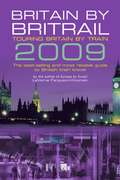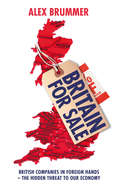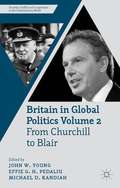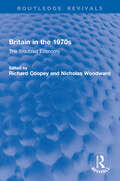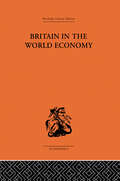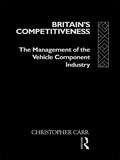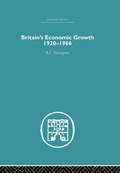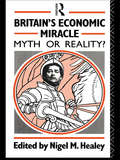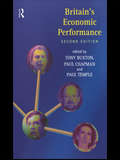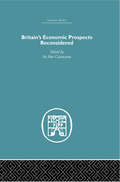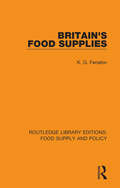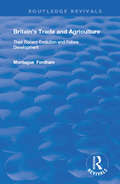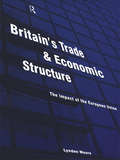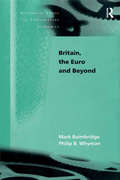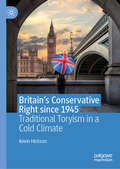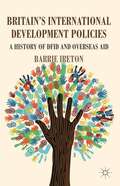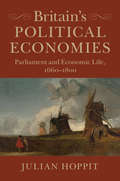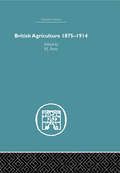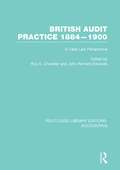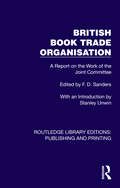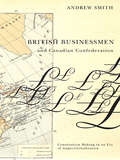- Table View
- List View
Britain by Britrail
by Laverne Ferguson-Kosinski Adam PriceFor nearly thirty years, Britain by BritRail has been the best-selling and most respected guide to the British train system. Newly revised and updated, this time-tested and reader-friendly book is packed with all the information you'll need for hassle-free travel. Learn how to use London, Edinburgh, Glasgow, and Cardiff as base cities for more than forty rail trips and day excursions to outlying areas and points of interest in England, Scotland, and Wales--from the medieval city of York, to Dover and its famous cliffs.
Britain for Sale: British Companies in Foreign Hands – The Hidden Threat to Our Economy
by Alex Brummer‘Buy British!’ we often hear, and many foreign companies have done just that. US food giant Kraft bought Cadbury in 2010, Dutch group AkzoNobel acquired ICI in 2007, Deutsche Bahn now own Arriva, and that’s just the beginning.The truth is that hundreds of billions of pounds’ worth of British businesses have been sold off abroad in recent years. But what does this takeover bonanza mean for our future economic health?In Britain for Sale, award-winning financial journalist Alex Brummer investigates this question, explaining why British companies are so irresistible to overseas buyers and weighing up the true cost of these transactions.
Britain in Global Politics Volume 2
by John W. YoungThis collection of essays focuses Britain's role in global affairs since the Second World War. The essays cover a broad field, from relations with Japan and China, through European and African developments, to defence planning in Whitehall.
Britain in the 1970s: The Troubled Economy (Routledge Revivals)
by Richard Coopey Nicholas WoodwardBritain in the 1970s (1996) provides an objective appraisal of the workings and failings of the British economy in the 1970s. Seen as a turning point in the postwar economy, the 1970s have come under increasing attention from historians, economists and political scientists. By examining the decade from a number of directions, this book confronts debates about, for example, the decline of economic performance, the origins of monetarism and deregulation, the role of inflation, and the importance of external forces in shaping the British economy. Other issues addressed include the development of economic opinion; industrial policy; mergers and acquisitions; union relations; entry into the Common Market; and the defence economy.
Britain in the World Economy
by Dennis H RobertsonConsidering Britain's physical capital, this book examines the distribution of investment between industries and between industry on the one hand and social and administrative purposes on the other. The Sterling Area is also examined, from the point of view of the UK and the rest of the world. The gold value of the dollar and the relationship of the US to the world economy are also discussed. All of these economic questions are placed in their appropriate historical perspective.
Britain'S Oceanic Empire
by H. V. Bowen Elizabeth Mancke John G. ReidThis pioneering comparative study of British imperialism in the Atlantic and Indian Ocean worlds draws on the perspectives of British newcomers overseas and their native hosts, metropolitan officials and corporate enterprises, migrants and settlers. Leading scholars examine the divergences and commonalities in the legal and economic regimes that allowed Britain to project imperium across the globe. They explore the nature of sovereignty and law, governance and regulation, diplomacy, military relations and commerce, shedding new light on the processes of expansion that influenced the making of empire. While acknowledging the distinctions and divergences in imperial endeavours in Asia and the Americas – not least in terms of the size of indigenous populations, technical and cultural differences, and approaches to indigenous polities – this book argues that these differences must be seen in the context of what Britons overseas shared, including constitutional principles, claims of sovereignty, disciplinary regimes and military attitudes.
Britain's Competitiveness: The Management of the Vehicle Component Industry
by Dr Christopher CarrThis book addresses the widespread concern regarding British industry's ability to compete internationally. Through an analysis of the UK automotive components sector, the author examines the central issues at the core of the competitiveness debate and outlines why there has been such a widespread and severe decline in the performance of British manufacturing. It draws on findings from visits to thirty British manufacturers and also to thirty overseas manufacturers in Germany, the USA and Japan, matched on a product basis to allow comparisons and a genuine international perspective. The author concludes that competitive decline is due, in part, to a weakness in the strategic management capability of many UK companies, and also to the lack of adequate co-ordination and co-operation between customer and supplier industries. Dr Carr identifies the remaining areas of vulnerability and priorities for action, and finally considers the implications for Britain's overall competitiveness.
Britain's Economic Growth 1920-1966
by A.J. YoungsonProfessor Youngson's book is an ubiased review of Britain's past experience and present difficulties. Few sacred cows are spared. There is no pretence that fundamental problems were resolved at the time of its first publication in 1967. Many econmic historians fail in their assessment of Britian's economic prospects as there is a tendency to look only at recent events to explain current problems. Youngson saw that this was short sighted. An economy, like an airliner, cannot suddenly change its course; it is subject to persistent forces and tendencies; it is powerfully affected by what has happened in the recent and sometimes in the not so recent past. Therefore to understand the problems of today we must know somthing of how persistent they are , and about what solutions have already been tried. This book provides a thorough examination of Britain's economic growth from 1920-1966 and contextualises Britain's situation within its true historical perspective. This book was first published in 1967.
Britain's Economic Miracle: Myth or Reality?
by Nigel M. HealeyRecent years have witnessed radical changes in British economic policy. However, the recession of the early nineties has cast doubts about whether these were successful. The much heralded economic miracle is now much tarnished. This book offers a timely and comprehensive non-technical throughout it analyses the basis of policy making as well as discussing its impact on economic performance.
Britain's Economic Performance
by Tony Buxton Paul Chapman Paul TempleThis new and substantially revised edition of Britain's Economic Performance provides a unique assessment of the current state of the supply-side of the economy. Written by a team of highly experienced, policy oriented applied economists, this volume will be a valuable source of reference, analysis and guidance for students and policy-makers.
Britain's Economic Prospects Reconsidered
by Alec CairncrossThis book is a sequal to Britain's Economic Prospects, the report issued in 1968 by the Brookings Institution and universally accepted as the most thorough and comprehensive study of the British Economy to have ever appeared. Two years later, just after the British General election, six fo the American economists who prepared the Brookings Report met with a number of other leading economists from Britain and the United States, at a weekend conference at Ditchley Park, to review the findings of the report. Papers submitted to the conference by four of the British Economists (R.C.C. Matthews, G.D.N. Worswick, E.H. Phelps Brown and M.V. Posner) covered the same ground as the Brookings Report - the role of demand management, trade and balance-of-payments problems, labour policies, and industrial policies. The conference also had before it a fifth paper, on fiscal policy and stabilization, which took issue with some of the views expressed in the Brookings report. These papers form the core of this book, which also contains an account of the conference discussions and concluding reflections by its Chairman, Sir Alec Cairncross, formerly Chief Economic Adviser to H.M. Government. Britain's Economic Prospects Reconsidered is neither a detailed critique of the Brookings Report nor a rejoinder to it, but rather an attempt to reassess British performance and policies in the light of experience since devaluation. Its central concern is the question of why economic growth in Britain since the war has been slower than in other countries. This book was first published in 1971.
Britain's Food Supplies (Routledge Library Editions: Food Supply and Policy)
by K. G. FenelonOriginally published in 1952. In this fascinating book that examines the statistics, the term food supplies is interpreted in a wide sense and it deals among other matters with such subjects as supplies from home agriculture and from overseas; food consumption; controls, rationing and price regulations, and Government purchasing of food. Included are chapters on world food supplies, international organizations concerned with food and agriculture, and development schemes in the Commonwealth and colonies. Food supply from the eighteenth century onwards is outlined and the dependence on imported food is discussed.
Britain's Trade and Agriculture: Their Recent Evolution and Future Development (Routledge Revivals)
by Montague FordhamPublished in 1932: The author in his Britain's Trade and Agriculture, though almost ruthlessly exposes the fallacies that lie behind the modern accepted views on industry and agriculture, though he obviously writes without desire to attract attention, but simply to clarify facts and to suggest practical solutions.
Britain's Trade and Economic Structure: The Impact of the EU
by Lynden MooreThis work examines the reasons behind Britain's economic decline since the 1960s. Focusing on the restructuring of British industry and trading policy, the author discusses the causes and effects of deindustrialization and changes to traditional trading patterns. Particular attention is devoted to the impact of the EU. The work provides: * A new perspective by focusing on industry and trade rather than monetary issues; * A good comparative study of Britain's trading partners and rivals; * An accessible and relatively jargon-free discussion of a topical and far-reaching subject.
Britain, the Division of Western Europe and the Creation of EFTA, 1955–1963 (Security, Conflict and Cooperation in the Contemporary World)
by Matthew Broad Richard T. GriffithsThis book traces the emergence of the European Free Trade Association (EFTA) from 1955 to 1963 amid the broader reshaping of the institutional architecture of post-war Europe. It considers the ill-fated Free Trade Area (FTA) proposal, the subsequent creation of EFTA, and the resulting division of Western Europe into two distinct trading blocs. At its core, the book provides an international history of a formative moment of post-war and European integration history, and explores the intense technical discussions among European states as they grappled with the prospect of deeper economic and political unity. It thus provides the first detailed analysis combining the FTA and EFTA negotiations, considering both state and non-state actors. Drawing on archives from Britain, Denmark, France, Germany, Ireland, Norway, the Netherlands, Sweden, Switzerland, and the US, as well as the records of the OEEC and EFTA, it examines the decision-making processes of those intimately involved as well as the institutional settings within which they were forced to reconcile their positions. At a key moment of contemporary European friction, the book offers a dialogue between the past and those trying to make sense of events that continue to shape Europe today.
Britain, the Euro and Beyond (Alternative Voices in Contemporary Economics)
by Philip B. Whyman Mark BaimbridgeThis important book provides an analysis of the economic relationship between Britain and the EU and discusses the future direction in which this relationship might develop. It examines the historic and contemporary costs and benefits of EU membership, and assesses whether this has been a burden or a benefit for the British economy. In addition the authors assess current trends and developments, most notably in the area of participation in Economic and Monetary Union (EMU) and the consequences that this would have. Questions of fiscal federalism, the development of a minimum level of social policy for Europe, together with the likely impact on business and trade unions are also considered. The authors then discuss potential future scenarios, including a more flexible loose membership arrangement or complete withdrawal, and the affect that a range of options might have on the British economy.
Britain’s Conservative Right since 1945: Traditional Toryism in a Cold Climate
by Kevin HicksonThis book provides a detailed analysis of the evolution of the Conservative Right in Great Britain since 1945. It first explores the movement’s core ideas and highlights points of tension between its different strands. The book then proceeds with a thematically structured discussion. The Conservative Right’s views on the decline and fall of the British Empire, immigration control, European integration, the British constitution, the territorial integrity of the United Kingdom, Britain’s economy, the welfare state, and social morality and social change are all explored. In the concluding chapter, the author evaluates the extent to which the Conservative Right has succeeded in its core objectives since 1945 and addresses how it can best respond to a contemporary Britain in which it instinctively feels uncomfortable. The book is based on extensive elite interviews and archival research and will be of interest to anyone who seeks to place the contemporary Conservative Right in a greater historical context.
Britain’s International Development Policies
by Barrie IretonBarrie Ireton tells the unique history of Britain's international development efforts from colonial times to the present day set in a global context. He brings together original research material as well as his personal knowledge over a 40 year career in government. He argues that the Department, led by successive Ministers, continued to pursue its basic mission of poverty reduction in the poorest countries. He also acknowledges important deviations from this trend, particularly during the 1980s when the Aid and Trade Provision became an aggressive use of aid to win export orders at the behest of the interventionist Department of Trade and Industry under an otherwise not interventionist conservative government.
Britain’s Political Economies: Parliament and Economic Life, 1660–1800
by Julian HoppitThe Glorious Revolution of 1688-9 transformed the role of parliament in Britain and its empire. Large numbers of statutes resulted, with most concerning economic activity. Julian Hoppit here provides the first comprehensive account of these acts, revealing how government affected economic life in this critical period prior to the Industrial Revolution, and how economic interests across Britain used legislative authority for their own benefit. Through a series of case studies, he shows how ideas, interests, and information influenced statutory action in practice. Existing frameworks such as 'mercantilism' and the 'fiscal-military state' fail to capture the full richness and structural limitations of how political power influenced Britain's precocious economic development in the period. Instead, finely grained statutory action was the norm, guided more by present needs than any grand plan, with regulatory ambitions constrained by administrative limitations, and some parts of Britain benefiting much more than others.
British Agriculture: 1875-1914 (Economic History Ser.)
by P. J. PerryProfound Changes took place in British Agriculture between 1875 and 1914. After the prosperous years of the mid-nineteenth century came a period of difficulty for landowners and farmers, with falling prices, lower rents and untenanted farms. Previously attributed to bad seasons and increased food imports, this book questions whether the unexpected depression was rather the evolutionary upheaval of a system forced reluctantly into change. Undoubtedly there was a crisis, in these decades farming ceased to be Britain's major industry; no longer able to supply all her own food, the country came to depend increasingly upon imports. Methods changed, cereal production yielding pre-eminence to pastoral farming. In recent years scholars have challenged traditional interpretations of the crisis, seeking a wider range of causes, characteristics and consequences. It has come to be seen as a phenomenon of change as much as of decay. This book brings together different views of the depression, ranging from contemporary evaluations to recent regional and econometric studies which stress its spatial and developmental character. Originally published in 1973, these eight contributions provide a survey of changing approaches to one of the major economic crises in modern history.
British Airways: "Go for It, America!" Promotion (A)
by Stephen A. Greyser John L. TeopacoSenior marketing executives of a major international airline are deciding on a strategy to address a crisis situation precipitated by a series of terrorist acts. The company is experiencing the worst downturn ever in its U.S.-U.K. travel business due to media reports and resulting consumer perceptions that Europe is under a "reign of terror." Alternative strategies range from doing nothing to staging an ambitious sales promotion. Major issues include: the role of sales promotion in addressing consumer perceptions of a life-and-death issue (i.e., terrorism), and the implementation and integration of advertising, sales promotion, and public relations efforts within a compressed time frame.
British Airways: Using Information Systems to Better Serve the Customer
by W. Earl Sasser Jr. Norman KleinExplores the uses of scanning technology, interactive software, and powerful data bases to assist customer relations representatives in resolving customer complaints. Competitive alliances in international markets are noted, but the focus is on the evolving commitment to customer service and the measures, technology, and economics that come into play to recover customers who have complained.
British Audit Practice 1884-1900: A Case Law Perspective (Routledge Library Editions: Accounting)
by John Richard Edwards Roy A. ChandlerThis book sheds light on the nature of the late nineteenth century audit by reference to the views expressed in 26 legal cases. The treatment of late nineteenth century legal issues which might appear somewhat unbalanced, viewed from today’s stand-point, is shown to be more even handed when seen against the back ground of a vigorous contemporary debate concerning all aspects of the auditors’ duties. This text therefore informs readers of the full breadth of the debate, and discusses a range of issues which may since have been overlooked, such as the Kingston Cotton Mill case, 1895, normally referred to only in the context of stock valuation but which also had a great deal to say about the appropriate method for valuing fixed assets.
British Book Trade Organisation: A Report on the Work of the Joint Committee (Routledge Library Editions: Publishing and Printing)
by F. D. SandersOriginally published in 1939, British Book Trade Organisation: A Report on the Work of the Joint Committee is a twelve-year study of the methods of book sales in Britain. The Joint Committee issued three reports, which were summarised here along with the Committee’s Recommendations, and an indication of the kind if action that had since resulted. A crucial factor in the push for further reforms that followed, today this title can be read in its historical context.
British Businessmen and Canadian Confederation
by Andrew SmithAndrew Smith discusses the role of British investors in Canadian Confederation, covering the period from the construction of the Grand Trunk Railroad in the 1850s to Canada's purchase of Rupert's Land in 1869-70. He describes how some investors lobbied the British government for the policies that made Confederation possible, working closely with the Fathers of Confederation, many of whom were participants in the same trans-Atlantic crony-capitalist system. British factory owners with classical liberal beliefs, however, disliked Confederation because they believed it would delay the political independence of the North American colonies, something they saw as beneficial.
